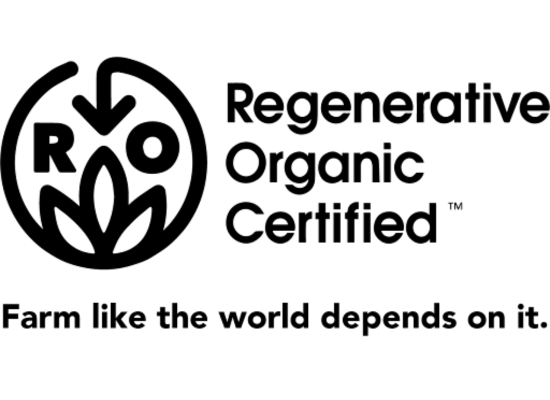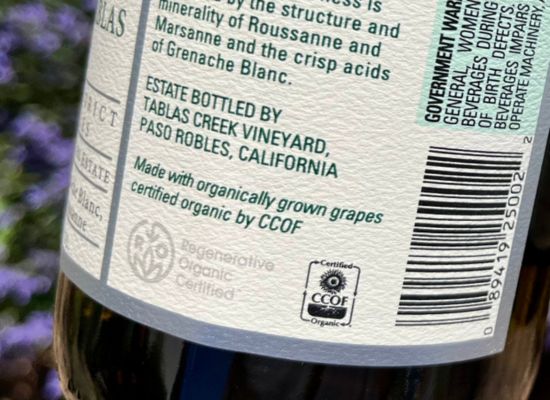Educating Sommeliers Worldwide.
By Beverage Trade Network

Organic wines in all their glory should be top of mind for most sommeliers and wine directors. This includes both domestic wine and imported ones. As Forbes recently reported, statistics show “an exponential increase in demand for organic wine, with a projected growth of 8.7% per year until 2027.” Another report says, “The organic wine market size has grown rapidly in recent years. It will grow from $10.85 billion in 2023 to $12.08 billion in 2024 at a compound annual growth rate (CAGR) of 11.3%.” Owing to demand, natural and organic wine production has increased dramatically in most regions.
Organic wine production is by definition ecologically friendly, and organic wineries often have intriguing stories behind them, a key to enhancing on-premise sales. Many US-based wine importers specialize in organic European and South American wines.
Sommeliers should be aware of some of the pitfalls in organic wine labeling. It’s not as straightforward as it should be.
The greatest example is this little detail. “The United States (U.S.) has an equivalence arrangement with the European Union (EU). The equivalence arrangement grants USDA-certified organic products access to the EU’s market and grants EU-certified organic products access to the U.S. market.” That sounds great, and fair, leading to enhanced freer trade. But there’s a catch, which also applies to the UK, “Wine must be produced and labeled according to the organic regulations of the destination country.” Wine is a unique exception to the international agreements regarding certified free trade in organic products.
A French, German, or Spanish wine that is certified organic in the EU will not be certified organic when it is imported to the US; these wines cannot be labeled as organic (even if they are produced that way). To make matters worse, this year the USDA started enforcement of the “Strengthening Organic Enforcement” regulations. As Hillebrand GORI explains, “Now, anyone buying, selling or trading organic products must be certified. This includes wine buyers, traders, private label brand owners, distributors, exporters, and importers, as well as some storage facilities.”
In the end, importing organic wine into the US just became much more burdensome. Now, even boutique importers must declare all organic wine imports and each wine must have a National Organic Program (NOP) Import Certificate. This applies to both cased and bulk wine imports. The US organic wine importer must have organic certification. Yes, even though importers have nothing to do with producing the wine, they have to be certified organic. Even, the foreign exporter must be certified organic and listed on that burdensome NOP Import Certificate. Finally, each and every piece of documentation related to the importation of the wine must indicate that the product is certified organic.
This has caused both producers and importers to throw up their hands. As Wine Enthusiast reported, “Your Favorite Organic Wine May Not Be ‘Organic’ Anymore.” Boutique importers rightly see the regulations as an “enormous, costly burden.” The result is that “many of your favorite organic bottles will be unavailable or in limbo for the foreseeable future, as importers hustle to get their wines re-certified.” This, of course, is as true for restaurant wine lists as it is for consumers.
Most European organic wine producers will now have to be re-certified as organic but using a US standard. Then they (and their importers) will face the vastly increased paperwork burdens.
Considering the closeness, value, and importance of the trade between them in wine, the US, Canada, the EU, and the UK should get together and produce consistent legislation regarding organic wine certification. There should no longer be exceptional burdens for wine producers and importers.

Much of this boils down to one simple issue: sulfites. The USDA says, “Any use of added sulfites makes the wine only eligible for the ‘made with [organic grapes] labeling category.” Such a wine may not use the USDA organic seal. So, in the US, it’s “just say no” to sulfites, any sulfites whatsoever, in the winemaking process. This has caused excellent wineries like Tablas Creek in California to simply forego organic labeling completely.
As WineSearcher succinctly explains, “Unhelpful discrepancies remain between EU and USDA codes. Wines that gain the USDA organic seal are organic wines with no added sulfites. Sulfur dioxide additions (potassium bisulfite or metabisulfite) of 100 parts per million are allowed in wines that may carry the description ‘made with organic grapes’. However, in Europe, organic wine may have up to 100 milligrams per liter sulfur dioxide content in dry red wines, with a 150mg/l limit on white and rosé wines.”
Jason Haas at Tablas Creek writes, “The fact that American organic wine is forced to be sulfite-free makes many of them short-lived and unstable.” This creates a big problem because both the drinking public and the sommelier community may conclude that “organic farming makes unreliable wine.” It also “reduces incentives for wineries to farm organically.” Haas points out that “it's probably not a coincidence that the percentage of wine grapes in California has lagged that in France, Spain, and Italy.”
This problem of the availability of excellent organic wines for restaurant wine programs in the US is now being further exacerbated by the new Strengthening Organic Enforcement regulation. This is not positive news for increasing the diversity and quality of organic wines, including those that are also biodynamic.
As Bonterra Organic Estates recently argued, “sulfites in wine are essential compounds that ensure the preservation, stability, and quality of wine. Sulfites play a crucial role in maintaining wine’s freshness and preventing spoilage. For most wine drinkers, sulfites are safe and will not cause any unwanted side effects such as headaches.” So, the “just say no to sulfites” attitude among US legislators is wrongheaded and has been for decades. Sulphur is an organic compound. It has been used for centuries in winemaking. The US should bring its legislation in line with the EU standard.
Haas told me “that the special status that the NOP standards apply to wine (basically any addition of sulfites renders you ineligible to use the organic seal) is counterproductive and has the net effect of discouraging organic farming in the United States and putting American organically farmed wines at a disadvantage compared to organic wines from around the world. That has been mitigated since the USDA's decision to allow organic certifier logos (in our case, CCOF and ROC) on wines as long as they conform to the "Made With Organic Grapes" standard. But I still think it isn't ideal.”
Haas decided to finally accept labeling some Tablas Creek wine as “made with organic grapes” but only with the addition of a Regenerative Organic Certified (ROC) label. Haas explained in 2022: “It turned out that because the ROC logo contains the word ‘organic’ written out [on the label], we needed also to include the seal of our organic certifier and the text "Made with organically grown grapes certified organic by CCOF [Tablas Creek’s certifying organization]" to be compliant. I'm not sure I would have wanted to do that without the ROC logo.” The relative giant, Bonterra, too, now produces ROC wines. Such a certification, label, and the practices behind them ensure an extremely high level of environmental commitment on the part of wineries. This includes prominently the goal of carbon sequestration in vineyard soils. ROC is on an upward trend, no thanks to the USDA.

Source: Tablas Creek
In sum, amidst the evolving landscape of organic wine production and importation, sommeliers and wine directors must stay informed about the regulatory complexities that influence their wine lists. While the demand for organic wines continues to rise, navigating the intricate labeling requirements and certification processes remains a significant challenge. By understanding these hurdles and advocating for more consistent international standards, wine professionals can better serve their customers and promote sustainable wine practices. Embracing labels like "Made with Organic Grapes" and the Regenerative Organic Certified (ROC) seal can help maintain a diverse and high-quality selection, ensuring that the integrity and appeal of organic wines are preserved for discerning palates.
Header Image Source: Bonterra